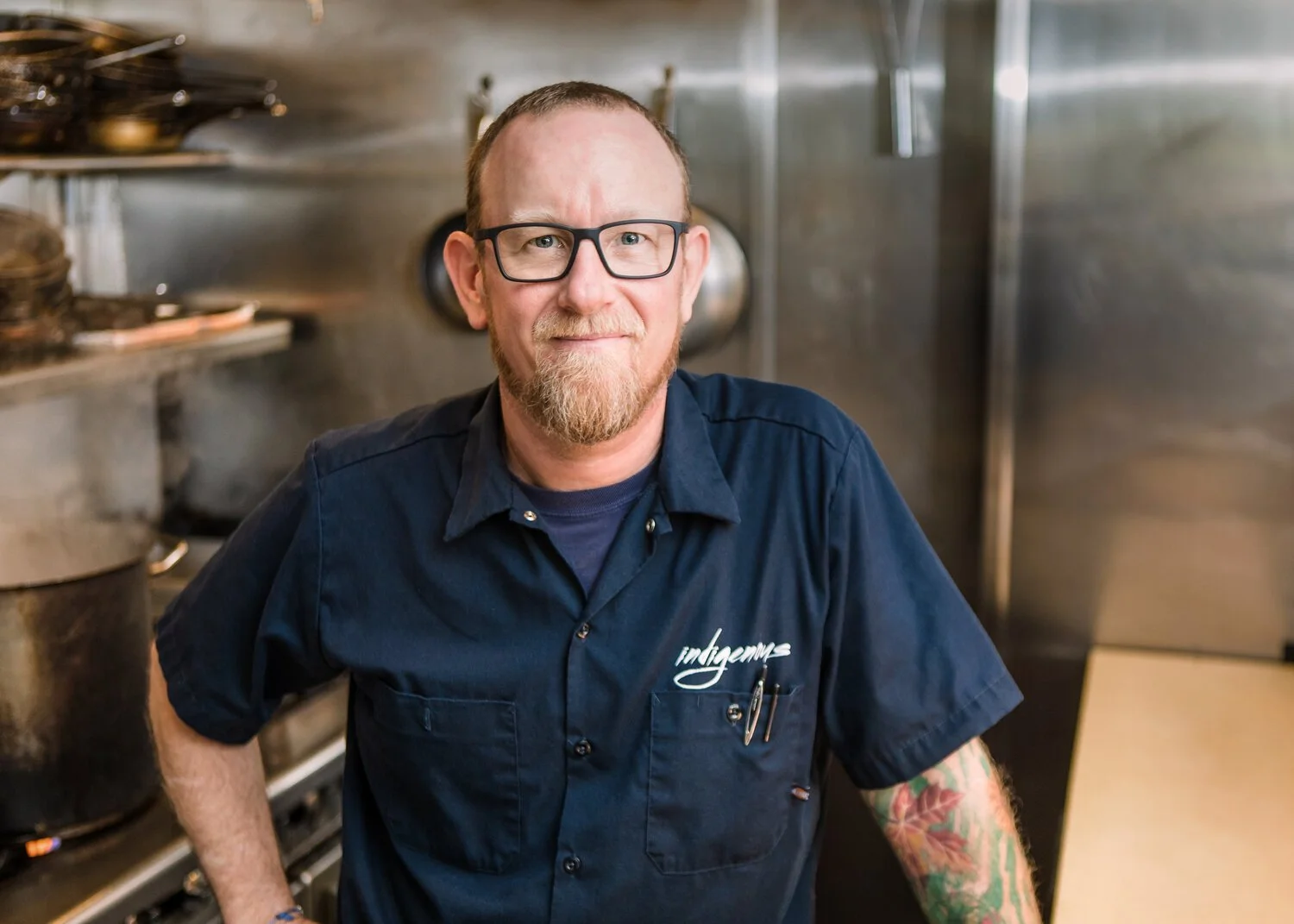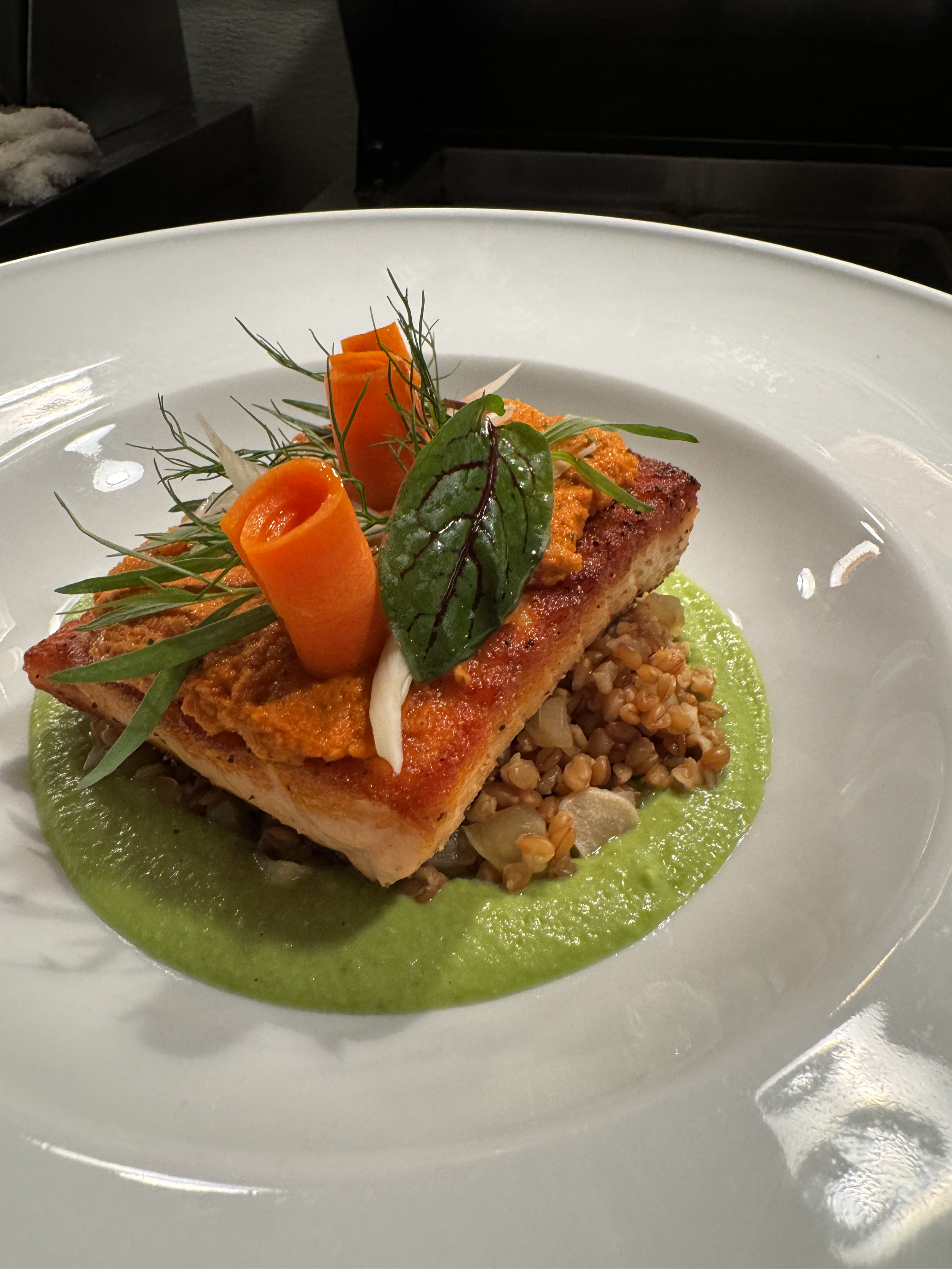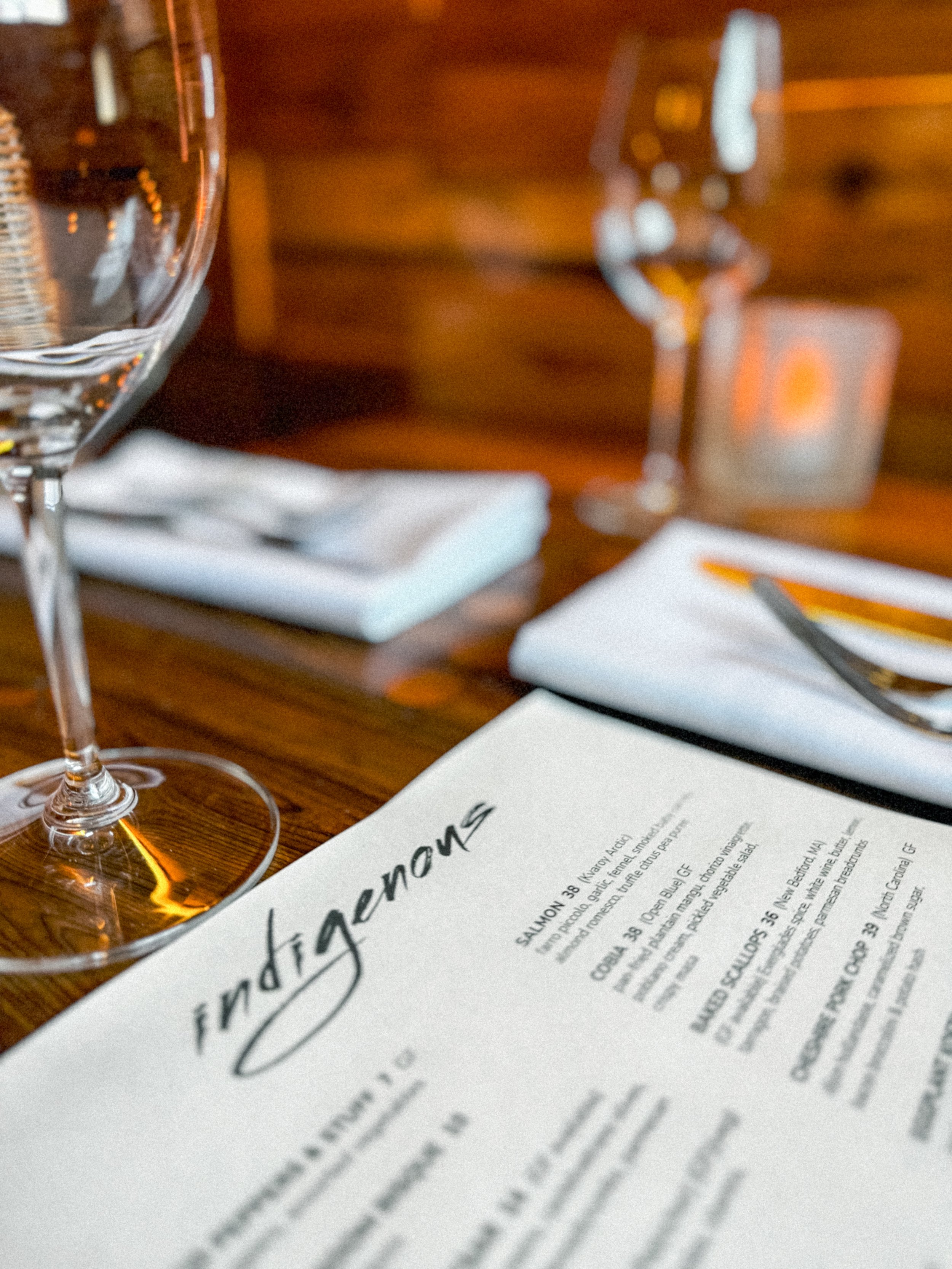In The Kitchen with Chef Steve Phelps
At Kvaroy Arctic, we are truly mesmerized by Chef Phelps' passion for sustainability, his efforts to minimize waste, and his role as a leader in promoting responsible aquaculture within the culinary world. That’s why we decided to personally experience his restaurant — Indigenous — cozily settled in the lush and historic Towles Court district in downtown Sarasota, FL.
On Chef Phelps’ menu, you will find seasonal American cuisine that evolves over the year, adapting to the peak availability of ingredients. With a dedicated emphasis on sustainable seafood, he forges strong partnerships with local fishermen, artisans, and farmers to uphold the utmost quality standards. He is also primarily committed to aquaculture. The bulk of the menu includes best-in-class seafood farms such as Kvaroy Arctic and Sun Shrimp.
What truly impressed us is that his attention to sustainability expands beyond the menu. At the end of each day, everything at the restaurant is composted, recycled, or repurposed — from pickled leftover vegetable trimmings to transformed wooden wine crates into a wall accent. While enjoying his carefully curated and intentional meals, we also had the incredible chance to talk with Chef Phelps who graciously shared his time and stories with us.
How does your commitment to sustainable aquaculture shape your culinary philosophy and influence your menu development?
Overfishing, pollution, global warming, and fish species declining in the world has made me realize that something needs to change. After trying to order grouper 3 days in a row and it being unavailable, something had to give, as this was a core menu item for me and I couldn't afford to be without any longer. The availability of aquaculture fish made it immediately attractive. Consistency made me put more commitment into it, and that led me to a lot more research and learning about what's out there.
How do you minimize waste in your kitchen, and how do you educate others in the food industry?
If we're talking about waste as a whole, it's much easier to manage in a small kitchen than larger commercial ones, but in either case, the team needs to be absolutely committed to make it happen. I have a local composter we've been using for the past 6 years or so, and it started out a bit rough, as not everything should be composted like onions or lemon wedges. As a whole, there's a benefit to doing it outside of it being good for the environment. We used to use 5 large trash bins a week, and now it's down to half of that, thereby reducing our solid waste bill.
For fish waste, understanding how to use the fish nose to tail is key. So many kitchens waste perfectly good pieces, not realizing there's great things to be made with it. Scraping bones for tartare, making stews, or fish dips are great ways to utilize the fish. You see some Whole Foods taking salmon scraps and turning them into smoked "salmon candy", and they are absolutely delicious. And they're not giving it away, either! They figured out how to unlock the value in these trimmings and make something really tasty, and are able to fetch a premium for it as well. Teaching staff is absolutely key to make it work long term, and sometimes you need to get a little creative, which is in every chef's blood.
You're an avid fisherman and proponent of (sustainable) wild-caught fish. While the wild vs. farmed fish debate will be around forever, what has led you to embrace both, and what has the reaction been of your guests?
I love to fish, and when I go fishing with my buddies, this discussion always comes up. There's a lot more acceptance now vs. 10 years ago, but there's still an uphill battle for some folks who just won't take the time to understand aquaculture. They don't understand offshore farms, RAS (recirculating aquaculture systems), raceways (flow-through systems), and all the technology advancements that have happened in the industry. Wild-caught fisheries have a lot of competition utilizing the same resources, whether it's commercial or recreational. The "pie" isn't getting any bigger regarding the amount of wild fish able to be caught, but that is not the case with aquaculture.
It's been really cool to see kelp farmers working with lobster fishermen recently in Maine. These lobstermen and women are able to diversify their income and reduce their reliance on a resource that's finite and heavily regulated. Kingfish now being raised in Maine is a great example of a historic fishing community starting to embrace aquaculture. Ultimately it helps provide jobs and more protein for the community/country, and the more people learn, the more they accept.
I am squarely in the middle of the debate, and wild-caught will always have a place on my menu, but I always make sure we use the right fish. I have some guests that demand "local" species, but they find my menu has fish from all over—Open Blue Cobia from Panama, Kvaroy Arctic Salmon from Norway, Riverence Trout from Idaho, etc. We regularly serve farmed Sun Shrimp, coming from down the road here in Southwest Florida, so that checks the box. We recently went 6 months without running any wild-caught seafood and nobody mentioned anything about it, so I think it's starting to stick.
What role do you believe chefs play in advocating for and advancing sustainability initiatives within the food industry?
We are the ambassadors. Anything we tie our names to we need to make sure we do our research and believe in what the companies are doing. Making great food is one thing, but once you get to a certain level, the story of the food plays an equally important role. Whether it's farming my own zucchini or visiting fish farms worldwide, these experiences add credibility to the programs I implement at the restaurant. Teaching our guests is almost as important as teaching the staff, and we try to educate as much as we can. People want to learn, and we often see our guests starting to research the places we get our fish from right on their phones at the table. Chefs must develop trust, and their business around it. Know your facts and make sure your team does too. The more visibility in the supply chain you can have, the more trust there is, and your reputation will grow as a result. The chefs that dive into these programs are the ones who we, as consumers, are the ones we want to follow.
Can you describe a particularly challenging aspect of promoting sustainable aquaculture in the culinary world, and how have you overcome this challenge in your own career?
I always go back to staff education and guest education. Our challenge in the industry is that the general public holds on to so many myths when it comes to fish farming. Old myths that were once true to an extent still haunt us, but it's getting better.
Lately I've been addressing this issue by breaking down the word "farm" when someone objects to farmed seafood. I ask them what they had for lunch. "I had a chicken caesar salad" they might say. How did that lettuce come about? Farmed. Where's that chicken from? Farmed. Nearly everything you eat is farmed; why all of the sudden is something wrong with fish farming? It often stops people in their tracks. It's amazing to see that "a-ha" moment when they start to piece it together, and it's helped me to get people to climb out of these myths. Farming is what we had to do when we killed all the wild buffalo, and it's what we have to do now that we're killing all of the wild fish. Aquaculture is the answer to the ever-growing demand of protein worldwide.
How do you balance the demands of running a successful restaurant with your dedication to sustainability?
It is key to understand that some premium products cost premium money, and it may not work for all restaurants. I often hear from other operators "that's really great, but we need to be at a lower price point for our customers". I understand it, but there's some great benefits in the consistency that comes with the products I use, and our customers are willing to pay a premium because they trust what we're serving. I know the farmed fish I order will be perfect every time. No product loss, consistent quality, price consistency, etc. Sure, prices will fluctuate from time to time, but they typically move with the overall economy, not based on the weather or other factors wild-caught seafood faces.
What advice would you give to aspiring chefs who want to integrate sustainability principles into their culinary careers?
Study, study, study! Read. Watch videos. Ask questions. Take opportunities to see things for yourself. Learn what's special about a product and celebrate it. Fish are cleaner, and frozen fish is becoming more acceptable. It's so much easier than managing fresh, and most consumers would be hard pressed to differentiate fresh from frozen once the fish is prepared. As an industry we need to be working with organizations like the CIA (Culinary Institute of America) and teaching chefs about sustainability principles younger in their careers. We need this more than ever—we're running out of proteins. I'm really enjoying this teaching part of my career and intend to continue doing so. And embrace aquaculture! I really do believe it is the fastest growing sector in farmed protein, so don't fight the current.
Looking towards the future, what innovations or developments in seafood are you most excited about?
One thing I've always been excited about is algae. I used to think it was just the green stuff on the side of a fish tank. Now seeing the industry globally utilizing the power of algae, I truly think it's the lifeline of seafood for generations to come. Other innovations in the industry like Kvaroy Arctic using lasers to zap sea lice is pretty incredible. It's even fun to talk about - think Austin Powers with the famous sharks with laser beams! Things like these are what I really get excited about.



